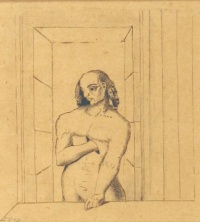Dictum
From The Art and Popular Culture Encyclopedia
(Difference between revisions)
| Revision as of 22:24, 15 July 2013 Jahsonic (Talk | contribs) ← Previous diff |
Revision as of 22:38, 15 December 2013 Jahsonic (Talk | contribs) Next diff → |
||
| Line 1: | Line 1: | ||
| - | {{Template}} | + | [[Image:The Heart Has Its Reasons by Odilon Redon.jpg |thumb|right|200px|''[[The heart has its reasons, of which reason knows nothing|The Heart Has Its Reasons]]'' (c.[[1887]]) by [[Odilon Redon]], a phrase from the ''[[Pensées]]'' ([[1669]]) by [[Blaise Pascal]]]]{{Template}} |
| # An authoritative statement; a dogmatic saying; an [[apothegm]]. | # An authoritative statement; a dogmatic saying; an [[apothegm]]. | ||
Revision as of 22:38, 15 December 2013

The Heart Has Its Reasons (c.1887) by Odilon Redon, a phrase from the Pensées (1669) by Blaise Pascal
|
Related e |
|
Featured: |
- An authoritative statement; a dogmatic saying; an apothegm.
- 1949, Bruce Kiskaddon, George R. Stewart, Earth Abides
- ...a dictum which he had heard an economics professor once propound...
- 1949, Bruce Kiskaddon, George R. Stewart, Earth Abides
- A judicial opinion expressed by judges on points that do not necessarily arise in the case, and are not involved in it.
- The report of a judgment made by one of the judges who has given it.
- An arbitrament or award.
See also
Unless indicated otherwise, the text in this article is either based on Wikipedia article "Dictum" or another language Wikipedia page thereof used under the terms of the GNU Free Documentation License; or on research by Jahsonic and friends. See Art and Popular Culture's copyright notice.

